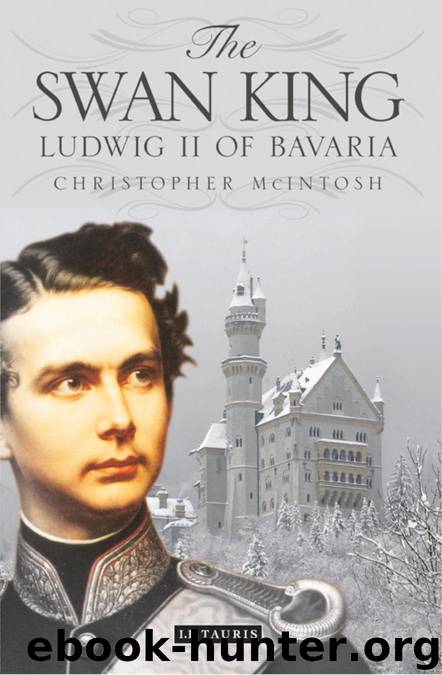The Swan King by Christopher McIntosh

Author:Christopher McIntosh [McIntosh, Christopher]
Language: eng
Format: epub
ISBN: 9780857732576
Publisher: Bloomsbury Publishing
Published: 2019-11-21T16:00:00+00:00
Hohenlohe was now thinking in terms of forming what he called a ‘United States of Southern Germany’. If this plan had come to fruition it is possible that France’s fears would have been stilled, that the Franco-Prussian War would never have taken place and that the subsequent tensions which led to the First and Second World Wars would never have happened. In the light of history, therefore, the southern states were presented at this juncture with a great opportunity. In the event they failed to seize it, for negotiations collapsed, and on 10 April 1868, in reply to an inquiry from the King, Hohenlohe wrote a long explanation of why the plan for a South German Confederation had come to nothing.
Ludwig must bear part of the blame for the missing of this opportunity because of his inability or unwillingness to taking a leading part in the negotiations, but the fault also lay partly with Hohenlohe. Though a man of basically good intentions, he tried to please too many people at once, and Ludwig would have been better served at this stage of his reign by a politician with a clear, unequivocal policy. Böhm writes of Hohenlohe that he was ‘a good diplomat, but no statesman and lacking in any productive ideas of his own. He always knew the short-cuts and side alleys, but was not able to follow a straight path with a firm step.’4
During this ominous period Ludwig must often have said to himself, like Margaret of Parma in Goethe’s Egmont: ‘I foresee much, yet cannot alter it.’ Some great force of transformation seemed to hold the whole of Germany in its thrall. Whether the sun was rising or setting over Germany was a matter of opinion. After all, in German the word Dämmerung means both ‘dawn’ and ‘twilight’. Ludwig, like many Germans, must have sensed both hope and foreboding. He must also have felt his loneliness more than ever — a loneliness which was increased by the loss of his grandfather on 29 February 1868. The ex-King Ludwig I died at his villa in Nice and was brought back to Munich to be buried in the church of Saint Boniface, one of the buildings which he had commissioned. Ludwig mourned the death of the old man, whom he had loved and admired, even though he had not always listened to his advice. It must have seemed like the severing of yet another link with the old Bavaria.
Everywhere the familiar pillars were trembling. Even in the Church all was far from well. In 1846 great hope had been placed in the new Pope, Pius IX, with his reputation for enlightenment and liberalism. But these hopes were soon dashed, for Pius turned to dictatorial and reactionary ways, curtailed freedom and democracy in the Church State and encouraged a new papal cult. In the face of bitter opposition this cult was formally promulgated in the doctrine of papal infallibility, which emerged from the First Vatican Council (1868—70). One of the opponents
Download
This site does not store any files on its server. We only index and link to content provided by other sites. Please contact the content providers to delete copyright contents if any and email us, we'll remove relevant links or contents immediately.
| Military | Political |
| Presidents & Heads of State | Religious |
| Rich & Famous | Royalty |
| Social Activists |
Waking Up in Heaven: A True Story of Brokenness, Heaven, and Life Again by McVea Crystal & Tresniowski Alex(37020)
Empire of the Sikhs by Patwant Singh(22186)
We're Going to Need More Wine by Gabrielle Union(18088)
Hans Sturm: A Soldier's Odyssey on the Eastern Front by Gordon Williamson(16820)
Leonardo da Vinci by Walter Isaacson(11925)
The Radium Girls by Kate Moore(10921)
Educated by Tara Westover(7084)
Tools of Titans by Timothy Ferriss(6968)
How to Be a Bawse: A Guide to Conquering Life by Lilly Singh(6704)
The Last Black Unicorn by Tiffany Haddish(5084)
Permanent Record by Edward Snowden(5008)
The Rise and Fall of Senator Joe McCarthy by James Cross Giblin(4853)
Promise Me, Dad by Joe Biden(4459)
The Wind in My Hair by Masih Alinejad(4428)
The Crown by Robert Lacey(4116)
A Higher Loyalty: Truth, Lies, and Leadership by James Comey(4042)
The Iron Duke by The Iron Duke(3653)
Joan of Arc by Mary Gordon(3271)
How to be Champion: My Autobiography by Sarah Millican(3195)
